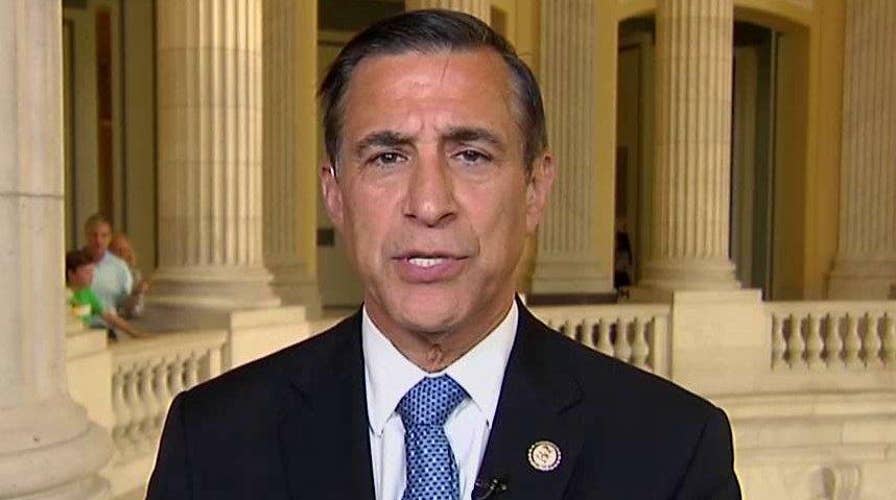Darrell Issa: Loretta Lynch, what were you thinking?
House Judiciary Committee member from California talks questions he would like to ask the attorney general at upcoming hearing
Republican Darrell Issa -- the combative California congressman who took Capitol Hill hearings to a new level of political theater -- is facing a tough reelection bid this year, in what has been one of the country's most conservative congressional districts.
Issa was elected to Congress in 2000, but his bid to win a ninth straight term is caught in political crosswinds.
Voters are wary of GOP presidential nominee Donald Trump, whom Issa has endorsed. And the number of registered Republican voters in his 49th congressional district -- from southern Orange County to northern San Diego County -- is steadily declining.
“It’s a competitive race,” said Nathan Gonzales, who handicaps congressional contests for his non-partisan Rothenberg and Gonzales Political Report, which last week moved the race out of the “safe” category for Republicans.
Issa, with an estimated net worth of $250 million, is also facing a formidable, well-funded challenge from Democrat Doug Applegate, a lawyer and retired Marine coronel in a district that includes Camp Pendleton, home to roughly 38,000 military families.
Beyond the Trump factor and the district’s changing demographics, Issa appears to have created some of his own political headwinds, with Applegate and others saying he has put his political aspirations ahead of the district’s needs.
Gonzales said he was “initially doubtful” about a possible Applegate upset, despite the first-time candidate finishing just 5 percentage points behind Issa in a June primary, setting up the November rematch.
Then the Democratic Congressional Campaign Committee a few weeks ago announced it would provide Applegate’s campaign with financial and strategic support.
“I took that as a sign of the Democrats’ interest in a race against the richest member of Congress,” Gonzales said.
Issa cultivated his national profile largely through his position as chairman of the powerful House Oversight Committee, relentlessly pursuing President Obama, then-Secretary of State Hillary Clinton and other top administration officials over such high-profile matters as the Benghazi terror attacks and the IRS targeting of Tea Party-type groups.
However, he appeared to show signs of vulnerability back in 2014, his last year as committee chairman.
Though Issa exposed administration shortcomings and mistakes, fellow Republicans grumbled that he had failed to connect Obama or the White House directly to any of the scandals. And House GOP leaders rejected his overtures to serve an extended term as chairman.
In one of his final act as chairman, Issa, furious over IRS official Lois Lerner refusing to testify before his committee, abruptly ended the hearing, then turned off the microphone for Maryland Rep. Elijah Cummings, the top Democrat on the committee.
Issa apologized, but Democrats and Republicans remained concerned.
"Washington is a mess, and Darrell Issa isn't part of the problem, he is the problem," Applegate said recently. "He's afraid that the curtain is coming down on him."
The 62-year-old Issa, who earlier this week picked up the key U.S. Chamber of Commerce endorsement said: "I'm going to be judged on whether I've done good service for my constituents, represented them honestly and fairly, and whether my judgment is trusted after so many terms of doing it."
Meanwhile, the affluent district -- which includes the late-President Nixon’s old San Clemente retreat -- has steadily become less Republican.
Since the district map was last redrawn, in 2012, the GOP’s advantage among registered voters has dropped from 14 to 9 percent, according to the most recent state records. (And the margin was more than 20 percent after the district was redrawn in 2002 to include Orange County.)
Like many Republicans this cycle, Issa is seeking reelection amid a younger and more diverse electorate. The situation is particularly challenging for GOP incumbents in California because the number of registered Hispanic votes, with whom Republicans have struggled to connect, has essentially doubled since 2012.
“It’s looking more like the general electorate,” a California Democratic strategist said last week. “But this is really all about atmospherics. The only real reason that Issa is vulnerable is because of Donald Trump.”
The only polling is the race is an internal poll by Applegate in late-August that showed Issa with a 45-to-43 percentage point lead.
Fundraising reports through June 30 show Issa with $3.8 million, compared with $135,000 for Applegate.
The advantage has helped Issa, who made his fortune largely in manufacturing car alarms, outspend his opponent nearly 15-to-1, with Applegate using some of his $50,000 in expenditures on ads trying to link Issa to Trump.
“Trump is the shadow that has been cast over dozens of races in this county.” Gonzales said. “The question is how dark will it be.”
The Associated Press contributed to this report.





